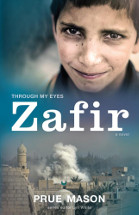Zafir by Prue Mason

Through my eyes series. Allen & Unwin, 2015. ISBN
9781743312544
(Age: 13+) Recommended. Having recently arrived in the Syrian city
of Homs, Zafir is relatively naive to the brutal realities of life
under the regime of President Bashar al-Assad and must try to
discover the facts without drawing attention to himself or his
family.
In happier times, Zaffir had lived with his Syrian parents in Dubai,
where his father was employed as a medical doctor and returning to
their homeland has exposed the family to unforeseen danger and
tension.
Set at the beginning of the Syrian uprising, the story tries to
explain how the populace overcame serious censorship and media
control to establish a collective awareness which led to resistance
against the oppressive dictatorship. The complexity of religious
differences between Moslems and Christians, together with
consideration of the political affiliations and influences of
supporters versus opponents of the regime form the basis of the
story. This is a country where to be heard criticising the President
may lead to arrest, torture and murder, hence to be involved in
organising protests as Zafir's uncle does is a dangerous practice.
In the prelude to this social turmoil, Zafir's life is relatively
mundane as he attempts to establish a friendship with Australian
girl Eleni who shares his love of skateboarding and is the daughter
of a visiting Orthodox Christian Priest whose family becomes close
to Zafir's. At school, Zafir's only friend Rami's father is in exile
after speaking out against the regime and the boy educates Zafir
with insight tinged by an understandable hint of paranoia. As Rami
is bullied and maltreated in the schoolyard by the more powerful
loyalist majority, Zafir is forced to make difficult decisions
regarding alliances and justice, mirroring what is happening in the
socio-political sphere.
An interesting feature of the tale is the consideration of social
media in such uprisings. Zafir's mother uses banned Facebook to
learn what is happening elsewhere and becomes vocal in calling for
resistance to the regime. The reader is prompted to evaluate the
potential cost in suffering, especially when online clamoring for
uprising originates from unrealistic idealists or those who are safe
from the consequences. Zafir's father, perhaps more aware of
potential outcomes, urges a more discrete and pragmatic approach,
however when circumstances demand, he responds, facing up to what
could be terrifying possibilities for all his family.
Dramatising the Syrian uprising with historical accuracy precludes
fanciful outcomes, however amongst the grim reality is hope for both
Zafir and his tormented country.
Rob Welsh